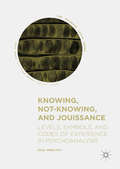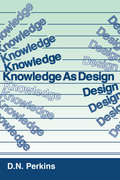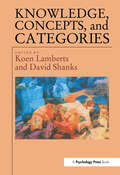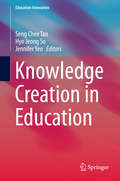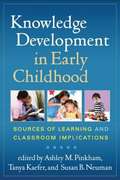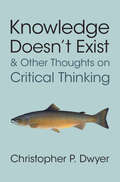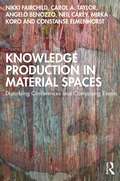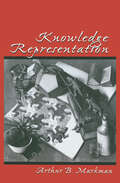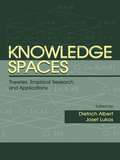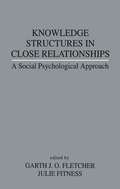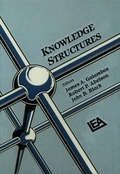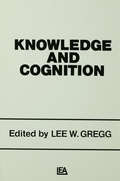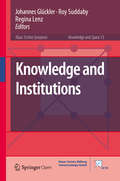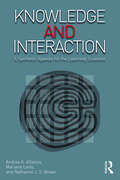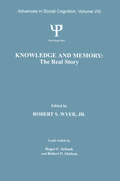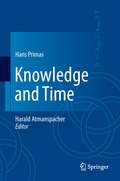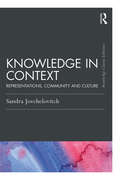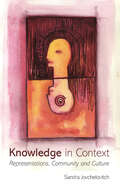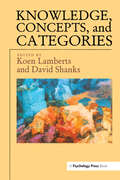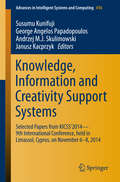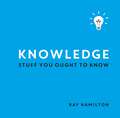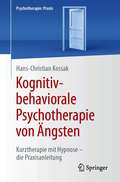- Table View
- List View
Knowing, Not-Knowing, and Jouissance: Levels, Symbols, And Codes Of Experience In Psychoanalysis (The\palgrave Lacan Ser.)
by Raul MoncayoThis book explores the practice and transmission of Lacanian and Freudian theory. It discusses the pure versus applied analysis of Lacanian and Freudian theory in practice; and the hierarchical versus circular transmissions within psychoanalytic organizations.Underpinned by extensive practical knowledge of the clinic, this work examines the differences between Freud and Lacan in their understanding of the subject and the unconscious and pushes them in new directions. The book also offers an analysis and commentary of several key Lacanian texts including an accessible study of the notoriously challenging text L'etourdit. Offering both divergent and reinforcing takes on Lacan, the author explores the traits that separate out the psychoanalyst from other twentieth-century thinkers and theorists. This book offers a clear clinical picture of where Lacanian psychoanalysis is today, both in the US and internationally.
Knowledge And Mind: A Philosophical Introduction
by Andrew Brook Robert J. StaintonThis is the only contemporary text to cover both epistemology and philosophy of the mind at an introductory level.
Knowledge As Design
by David N. PerkinsFirst published in 1986. Routledge is an imprint of Taylor & Francis, an informa company.
Knowledge Concepts and Categories (Studies In Cognition Ser.)
by Koen LambertsKnowledge, Concepts and Categories brings together an overview of recent research on concepts and knowledge that abstracts across a variety of specific fields of cognitive psychology. Readers will find data from many different areas: developmental psychology, formal modelling, neuropsychology, connectionism, philosophy, and so on. The book can be divided into three parts. Chapters 1 to 5 each contain a thorough and systematic review of a significant aspect of research on concepts and categories. Chapters 6 to 9 are concerned primarily with issues related to the taxonomy of human knowledge. Finally, Chapters 10 to 12 discuss formal models of categorization and function learning. The purpose of these three chapters is to provide a few examples of current formal modelling of conceptual behaviour. Knowledge, Concepts and Categories will be welcomed by students and researchers in cognitive psychology and related areas as an unusually wide-ranging and authoritative review of an important subfield of psychology.
Knowledge Creation in Education
by Seng Chee Tan Hyo Jeong So Jennifer YeoThis book arises from research conducted through Singapore's National Institute of Education on such topics as integrating knowledge building pedagogies into Singaporean classrooms, with both students and teachers across school levels, from primary schools to high schools. Additionally, international scholars contribute research on theories of knowledge creation, methodological foundations of research on knowledge creation, knowledge creation pedagogies in classrooms and knowledge creation work involving educators. The book is organized in two sections. Section A focuses on theoretical, technological and methodological issues, where sources of justification for claims are predominantly theories and extant literature, although empirical evidence is used extensively in one chapter. Section B reports knowledge creation practices in schools, with teachers, students or both; the key sources of justification for claims are predominantly empirical evidence and narratives of experience The editor asserts that schools should focus on developing students' capacity and disposition in knowledge creation work; at the same time, leaders and teachers alike should continue to develop their professional knowledge as a community. In the knowledge building vernacular, the chapters are knowledge artifacts - artifacts that not only document the findings of the editors and authors, but that also mediate future advancement in this area of research work. The ultimate aim of the book is to inspire new ideas, and to illuminate the path for researchers of similar interest in knowledge creation in education.
Knowledge Development in Early Childhood
by Tanya Kaefer Ashley PinkhamSynthesizing cutting-edge research from multiple disciplines, this book explores how young children acquire knowledge in the "real world" and describes practical applications for early childhood classrooms. The breadth and depth of a child's knowledge base are important predictors of later literacy development and academic achievement. Leading scholars describe the processes by which preschoolers and primary-grade students acquire knowledge through firsthand experiences, play, interactions with parents and teachers, storybooks, and a range of media. Chapters on exemplary instructional strategies vividly show what teachers can do to build children's content knowledge while also promoting core literacy skills.
Knowledge Doesn't Exist and Other Thoughts on Critical Thinking
by Christopher P. DwyerCritical thinking (CT) is essential in education, the workplace, and everyday life, yet many struggle to understand or apply it effectively. This book breaks down the 'what, how, and when' of CT in a clear, accessible way, making it practical for readers from all walks of life. Drawing on over fifteen years of researching CT, Dwyer presents accessible evidence-based lessons and strategies for using CT in real-world situations, helping readers navigate the overwhelming flood of information we face daily. Written in an informal, engaging tone, this book makes CT approachable for anyone looking to improve their decision-making skills.
Knowledge Production in Material Spaces: Disturbing Conferences and Composing Events
by Neil Carey Carol A. Taylor Nikki Fairchild Angelo Benozzo Mirka Koro Constanse ElmenhorstKnowledge Production in Material Spaces is a curation of the interventions that the authors undertook at a range of academic conferences since 2016. It problematizes disciplined practices and expectations governing academic conference spaces and generates new ways of thinking and doing conferences otherwise. The authors use posthuman, feminist materialist and post-qualitative theories to disrupt knowledge production in neoliberal and bureaucratic conferences spaces. The analysis they offer, and the rhizomatic writing and presentational styles they use, promote a form of educational activism through theory. They interrogate the conference space as a regulated, normalized and standardized mode of academic knowledge production – which they call the ‘AcademicConferenceMachine’ – and playfully subvert the dominant meanings and modes of conferences and workshops to show how we can better interact and produce research, with and for each other. The authors indicate how creative conference practices promote playful possibilities to imagine and produce knowledge differently. This book will appeal to audiences ranging from established professionals to early career scholars, doctoral and master’s students in Education and the social sciences.
Knowledge Representation
by Arthur B. MarkmanKnowledge representation is fundamental to the study of mind. All theories of psychological processing are rooted in assumptions about how information is stored. These assumptions, in turn, influence the explanatory power of theories. This book fills a gap in the existing literature by providing an overview of types of knowledge representation techniques and their use in cognitive models. Organized around types of representations, this book begins with a discussion of the foundations of knowledge representation, then presents discussions of different ways that knowledge representation has been used. Both symbolic and connectionist approaches to representation are discussed and a set of recommendations about the way representations should be used is presented. This work can be used as the basis for a course on knowledge representation or can be read independently. It will be useful to students of psychology as well as people in related disciplines--computer science, philosophy, anthropology, and linguistics--who want an introduction to techniques for knowledge representation.
Knowledge Spaces: Theories, Empirical Research, and Applications
by Dietrich Albert Josef LukasBased on the formal concept of "knowledge structures" originally proposed by Jean-Claude Falmagne and Jean-Paul Doignon, this book contains descriptions of methodological developments and experimental investigations as well as applications for various knowledge domains. The authors address three main topics: * theoretical issues and extensions of Doignon & Falmagne's theory of knowledge structures; * empirical validations of specific problem types and knowledge domains, such as sentence comprehension, problem solving in chess, inductive reasoning, elementary mathematical reasoning, and others; and * application of knowledge structures in various contexts, including knowledge assessment, intelligent tutoring systems, and motor learning. Unlike most other approaches in the literature in cognitive psychology, this book provides both a rigorous mathematical formulation of knowledge-related psychological concepts and its empirical validation by experimental data.
Knowledge Structures in Close Relationships: A Social Psychological Approach
by Garth J. O. Fletcher Julie FitnessThirty-three of the top scholars in this fast moving domain present a picture of work at the cusp in social psychology -- work that deals with cognition and affect in close relationships. The present volume contains a wealth of research findings and influential theoretical accounts that spring as much from indigenous work in the close relationship field as from purebred social cognition. The chapters introduce theories and research programs concerned with the role of individual and couple differences in close relationship knowledge structures. They deal with the role of emotion and affect in close relationships. And they discuss the function of cognition and knowledge structures in relation to the developmental course of close relationships. Each section is accompanied by a critical review written by an expert in the field. This volume is a must for any close relationship scholar interested in the latest research and theorizing about close relationships that adopt a social psychological perspective. It will also be of interest to scholars and students working in clinical psychology, social cognition, communication, individual differences, and family studies.
Knowledge Structures: An Inquiry Into Human Knowledge Structures (Artificial Intelligence Ser.)
by Robert P. Abelson John B. Black James A. GalambosFirst Published in 1986. This book marks a watershed in cognitive science activity at Yale University. Over the past decade, the cognitive science orientation has become more and more integrated into the mainstream of cognitive psychology, and artificial intelligence workers now feel comfortable thinking about psychological experimentation. This book collects in one place the research work which concentrates on covering topics in the representation, processing, and recall of meaningful verbal .materials. Several of the chapters are first reports of research; others are specially prepared reviews and elaborations of research reported previously. Here it is all together: Studies of scripts, plans, and higher-level knowledge structures; analyses of knowledge structure activation, of autobiographical memory, of the phenomenon of reminding, of the summarization of text, of explanations for events, and more.
Knowledge Translation in Context
by Anne Marshall Bonnie Leadbeater Elizabeth M. BanisterThe main goal of knowledge translation (KT) is to ensure that diverse communities benefit from academic research results through improved social and health outcomes. But despite growing interest in researcher-user collaborations, little is known about what makes or breaks these types of relationships. Knowledge Translation in Context is an essential tool for researchers to learn how to be effective partners in the KT process.Drawing on expertise and studies from across the globe, Elizabeth Banister, Bonnie Leadbeater, and Anne Marshall outline a variety of perspectives on KT processes. Case studies outline the uses of KT in many contexts, including community, policy, Indigenous, and non-profit organizations. While recognizing the specificity of each situation, Knowledge Translation in Context highlights the most important elements that have led KT to succeed (or fail) as a dynamic, multidirectional process.
Knowledge and Cognition (Carnegie Mellon Symposia on Cognition Series)
by Lee W. GreggFirst Published in 1974. This volume is a collection of the papers presented at the Ninth Annual Symposium on Cognition, held at Carnegie-Mellon University in May 1973. The subject of the symposium was knowledge, or rather its internal representation in human memory, or in computer systems. Of all the recent symposia in this series, this one represents a meeting of the minds, in that all of the participants were strongly oriented toward information processing theories of cognition.
Knowledge and Institutions (Knowledge and Space #13)
by Roy Suddaby Johannes Glückler Regina LenzThis open access book bridges the disciplinary boundaries within the social sciences to explore the role of social institutions in shaping geographical contexts, and in creating new knowledge. It includes theorizations as well as original empirical case studies on the emergence, maintenance and change of institutions as well as on their constraining and enabling effects on innovation, entrepreneurship, art and cultural heritage, often at regional scales across Europe and North America. Rooted in the disciplines of management and organization studies, sociology, geography, political science, and economics the contributors all take comprehensive approaches to carve out the specific contextuality of institutions as well as their impact on societal outcomes. Not only does this book offer detailed insights into current debates in institutional theory, it also provides background for scholars, students, and professionals at the intersection between regional development, policy-making, and regulation.
Knowledge and Interaction: A Synthetic Agenda for the Learning Sciences
by Andrea A. DiSessa Mariana Levin Nathaniel J.S. BrownDecades of research in the cognitive and learning sciences have led to a growing recognition of the incredibly multi-faceted nature of human knowing and learning. Up to now, this multifaceted nature has been visible mostly in distinct and often competing communities of researchers. From a purely scientific perspective, "siloed" science—where different traditions refuse to speak with one another, or merely ignore one another—is unacceptable. This ambitious volume attempts to kick-start a serious, new line of work that merges, or properly articulates, different traditions with their divergent historical, theoretical, and methodological commitments that, nonetheless, both focus on the highly detailed analysis of processes of knowing and learning as they unfold in interactional contexts in real time. Knowledge and Interaction puts two traditions in dialogue with one another: Knowledge Analysis (KA), which draws on intellectual roots in developmental psychology and cognitive modeling and focuses on the nature and form of individual knowledge systems, and Interaction Analysis (IA), which has been prominent in approaches that seek to understand and explain learning as a sequence of real-time moves by individuals as they interact with interlocutors, learning environments, and the world around them. The volume’s four-part organization opens up space for both substantive contributions on areas of conceptual and empirical work as well as opportunities for reflection, integration, and coordination.
Knowledge and Memory: Advances in Social Cognition, Volume VIII (Advances in Social Cognition Series)
by Robert S. Wyer Robert P. Abelson Roger C. SchankNarrative forms of mental representation and their influence on comprehension, communication and judgment, have rapidly become one of the main foci of research and theory in not only psychology but also other disciplines, including linguistics, sociology, and anthropology. No one has been more responsible for the awakening of interest in this area than Roger Schank and Bob Abelson. In their target article, they argue that narrative forms of mental representation, or "stories," are the basic ingredients of social knowledge that play a fundamental role in the comprehension of information conveyed in a social context, the storage of this information in memory, and the later communication of it to others. After explicating the cognitive processes that underlie the construction of narratives and their use in comprehension, memory and communication, the chapter authors consider the influence of stories on a number of more specific phenomena, including political judgment, marital relations and memory distortions that underlie errors in eyewitness testimony. The provocativeness of the target chapter is matched by that of the companion articles, each of which not only provides an important commentary on Schank and Abelson's conceptualization, but also makes an important contribution to knowledge in its own right. The diversity of perspectives reflected in these articles, whose authors include researchers in linguistics, memory and comprehension, social inference, cognitive development, social judgment, close relationships, and social ecology, testifies to the breadth of theoretical and empirical issues to which the target chapter is potentially relevant. This volume is a timely and important contribution to research and theory not only in social cognition but in many other areas as well.
Knowledge and Time
by Harald Atmanspacher Hans PrimasThis is a unique volume by a unique scientist, which combines conceptual, formal, and engineering approaches in a way that is rarely seen. Its core is the relation between ways of learning and knowing on the one hand and different modes of time on the other. Partial Boolean logic and the associated notion of complementarity are used to express this relation, and mathematical tools of fundamental physics are used to formalize it. Along the way many central philosophical problems are touched and addressed, above all the mind-body problem. Completed only shortly before the death of the author, the text has been edited and annotated by the author's close collaborator Harald Atmanspacher.
Knowledge in Context: Representations, Community and Culture (Psychology Press & Routledge Classic Editions)
by Sandra JovchelovitchIn this classic edition of her groundbreaking text Knowledge in Context, Sandra Jovchelovitch revisits her influential work on the societal and cultural processes that shape the development of representational processes in humans. Through a novel analysis of processes of representation, and drawing on dialogues between psychology, sociology and anthropology, Jovchelovitch argues that representation, a social psychological construct relating Self, Other and Object-world, is at the basis of all knowledge. Exploring the dominant assumptions of western conceptions of knowledge and the quest for a unitary reason free from the ‘impurities’ of person, community and culture, Jovchelovitch recasts questions related to historical comparisons between the knowledge of adults and children, ‘civilised’ and ‘primitive’ peoples, scientists and lay communities and examines the ambivalence of classical theorists such as Piaget, Vygotsky, Freud, Durkheim and Lévy-Bruhl in addressing these issues. Featuring a new introductory chapter, the author evaluates the last decade of research since Knowledge in Context first appeared and reassesses the social psychology of the contemporary public sphere, exploring how challenges to the dialogicality of representations reconfigure both community and selfhood in this early 21st century. This book will make essential reading for all those wanting to follow debates on knowledge and representation at the cutting edge of social, cultural and developmental psychology, sociology, anthropology, development and cultural studies.
Knowledge in Context: Representations, Community and Culture (Psychology Press And Routledge Classic Editions Ser.)
by Sandra JovchelovitchThis book explores the relationship between knowledge and context through a novel analysis of processes of representation. Sandra Jovchelovitch argues that representation, a social psychological construct relating self, other and object-world, is at the basis of all knowledge. Understanding its genesis and actualisation in individual and social life explains what ties knowledge to persons, communities and cultures. It is through representation that we can appreciate the diversity of knowledge, and it is representation that opens the epistemic function of knowing to emotional and social rationalities. Drawing on dialogues between psychology, sociology and anthropology, Jovchelovitch explores the dominant assumptions of western conceptions of knowledge and the quest for a unitary reason free from the ‘impurities’ of person, community and culture. She recasts questions related to historical comparisons between the knowledge of adults and children, ‘civilised’ and ‘primitive’ peoples, scientists and lay communities and examines the ambivalence of classical theorists such as Piaget, Vygotsky, Freud, Durkheim and Lévy-Bruhl in addressing these issues. Against this background, Jovchelovitch situates and expands Moscovici’s theory of social representations, developing a framework to diagnose and understand knowledge systems, how they relate to different communities and what defines dialogical and non-dialogical encounters between knowledges in contemporary public spheres. Diversity in knowledge, she shows, is an asset of all human communities and dialogue between different forms of knowing constitutes the difficult but necessary task that can enlarge the frontiers of all knowledges. Knowledge in context will make essential reading for all those wanting to follow debates on knowledge and representation at the cutting edge of social, cultural and developmental psychology, sociology, anthropology, development and cultural studies.
Knowledge, Concepts And Categories (Studies in Cognition)
by Koen Lamberts David ShanksThis text brings together an overview of recent research on concepts and knowledge that abstracts across a variety of specific fields of cognitive psychology. Readers will find data from many different areas, including developmental psychology, formal modelling, neuropsychology and connectionism.
Knowledge, Information and Creativity Support Systems
by George Angelos Papadopoulos Janusz Kacprzyk Susumu Kunifuji Andrzej M. J. SkulimowskiThisvolume consists of a number of selected papers thatwere presented at the 9th International Conference on Knowledge, Informationand Creativity Support Systems (KICSS 2014) in Limassol, Cyprus, after theywere substantially revised and extended. The 26 regularpapers and 19 short papers included in this proceedings cover all aspects ofknowledge management, knowledge engineering, intelligent information systems,and creativity in an information technology context, including computationalcreativity and its cognitive and collaborative aspects.
Knowledge: Stuff You Ought to Know
by Ray HamiltonThis outrageously informative book is packed full of fascinating nuggets of history, science, literature, technology, sports, geography, culture and miscellanea from every corner of the world – enough mind-blowing trivia to ensure you’re never short of a jaw-dropping conversation starter (or stopper) again.
Knowledge: Stuff You Ought to Know
by Ray HamiltonThis outrageously informative book is packed full of fascinating nuggets of history, science, literature, technology, sports, geography, culture and miscellanea from every corner of the world – enough mind-blowing trivia to ensure you’re never short of a jaw-dropping conversation starter (or stopper) again.
Kognitiv-behaviorale Psychotherapie von Ängsten: Kurztherapie mit Hypnose - die Praxisanleitung (Psychotherapie: Praxis)
by Hans-Christian KossakIn diesem Praxismanual erfahren Psychotherapeuten, wie sie mit Kurztherapie bei vielen Patienten mit Ängsten schnell und dauerhaft wirksam werden können. Dr. Kossak kombiniert die beiden effektiven Methoden Hypnose und kognitive Verhaltenstherapie: Sie wirkt meist bereits unmittelbar nach nur einer Sitzung. Klar gegliedert führt der Autor in die zugrundeliegenden Theorien der Methode ein, die dann im umfangreichen Praxisteil direkt nutzbar werden. Die Falldarstellungen mit Studienfragen machen diese Behandlung konkret nachvollziehbar. Die Effektivität ist durch große, anhaltende Katamnesezeiträume belegt. Geschrieben für ... Psychotherapeuten, Ärzte, Psychiater, Psychologen, Zahnärzte, Coaches und Studierende in diesen Fächern. Über den Autor: Dr. Hans-Christian Kossak, Dipl.-Psych., Psychologischer Psychotherapeut und Kinder- und Jugendlichenpsychotherapeut mit Ausbildungszertifikaten in Verhaltenstherapie, Gesprächspsychotherapie, Hypnosetherapie. Gründer der Psychotherapie in der Kombination von kognitiver Verhaltenstherapie und Hypnose. Schwerpunkt: Ängste, Psychosomatik, Lern- und Leistungsstörungen. Er war Leiter der Katholischen Beratungsstelle für Erziehungs- und Familienfragen, Bochum; Dozent und Ausbilder von Psychotherapeuten in Hypnose und Verhaltenstherapie; Referent auf Fachkongressen. Autor zahlreicher wissenschaftlicher Fachartikel und Fachbücher.
